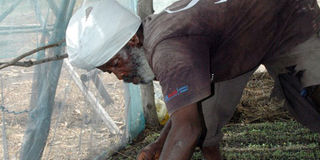Lethal moth could spell doom to EU exports

Pepper farmer Mr Samuel Ndichu attends to his pepper nursery from his farm in Mpeketoni in this picture March 17, 2014. PHOTO | LABAN WALLOGA |
What you need to know:
- Farmers in pepper-growing areas of central Kenya, Naivasha, Athi River, Kitengela and Isinya have been placed on high alert after the outbreak of the pest — false codling moth (FCM).
Kenya’s pepper exports to the European Union (EU) risk a ban following the emergence of a new and lethal pest that is wreaking havoc on the crop.
Farmers in pepper-growing areas of central Kenya, Naivasha, Athi River, Kitengela and Isinya have been placed on high alert after the outbreak of the pest — false codling moth (FCM).
Scientists say no pesticide has been identified to deal with the new threat that has already seen Capsicum produce from Uganda banned from the EU market.
According to Mr Samuel Kagumba, a sanitary and phytosanitary consultant, FCM threatens Kenya’s grip on the fresh produce market in Europe.
“The false codling moth has affected Uganda’s pepper exports to the EU market due to rigorous phytosanitary requirements imposed on the crop,” he said.
Speaking in Naivasha, Mr Kagumba said EU importers were demanding that any commodity infected by the moth should be banned.
He urged the Ministry of Agriculture to conduct national surveillance to ascertain the geographical spread of the pest.
The moth, whose scientific name is Thaumatotibia leucotreta, has shifted from citrus to capsicum produce, and there are fears that it could spread to roses.
The new threat comes at a time when Kenya is grappling with the aftermath of a tomato disease (Tuta absoluta) that has devastated the crop in many parts of the country.
According to experts from the government and the Fresh Produce Exporters Association of Kenya, no known protection against the pest has been discovered.
FPEAK technical manager Francis Wario said the horticulture sector could lose $70 million worth of exports due to stringent rules imposed by the EU on Kenyan fresh produce.
He said Kenya’s fresh produce is facing growing concerns on issues related to food safety, pests, quarantine and the farming environment.
“There is an urgent need to train horticulture growers on how to deal with emerging pests and diseases. The market is concerned about the maximum residual levels (mls) in fresh produce,” he said.





